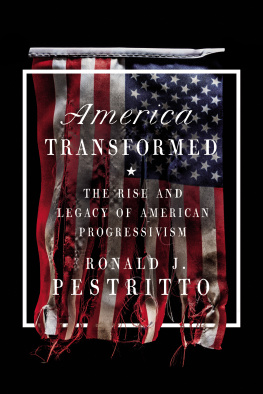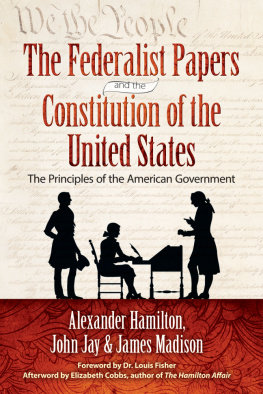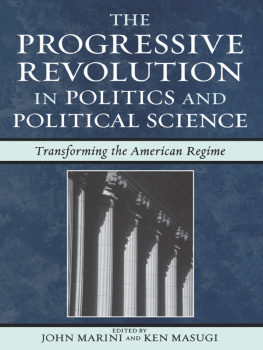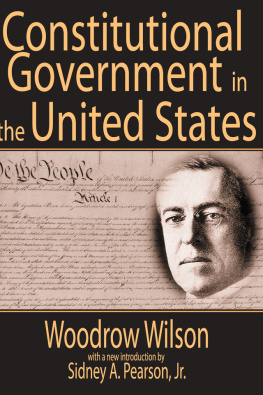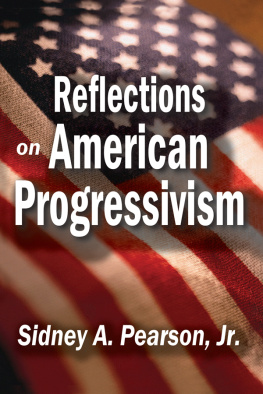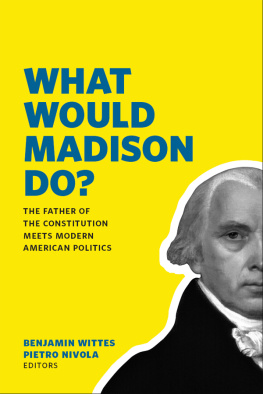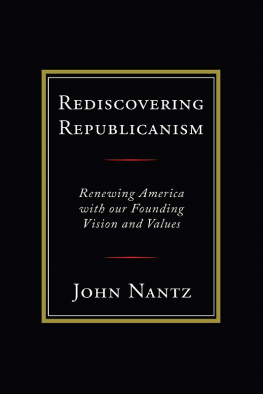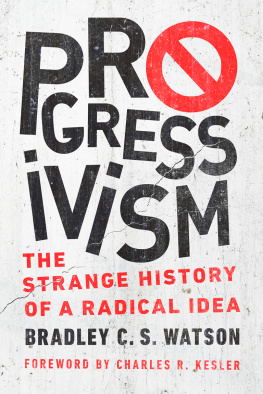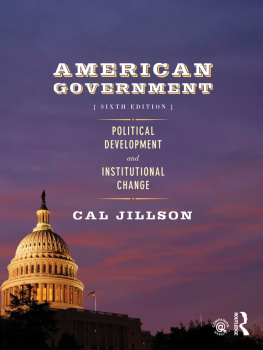Contents
Page List
Guide
America
TRANSFORMED
2021 by Ronald J. Pestritto
All rights reserved. No part of this publication may be reproduced, stored in a retrieval system, or transmitted, in any form or by any means, electronic, mechanical, photocopying, recording, or otherwise, without the prior written permission of Encounter Books, 900 Broadway, Suite 601, New York, New York, 10003.
First American edition published in 2021 by Encounter Books, an activity of Encounter for Culture and Education, Inc., a nonprofit, tax-exempt corporation.
Encounter Books website address: www.encounterbooks.com
Manufactured in the United States and printed on acid-free paper. The paper used in this publication meets the minimum requirements of ANSI/NISO Z39.481992
(R 1997) (Permanence of Paper).
FIRST AMERICAN EDITION
LIBRARY OF CONGRESS CATALOGING-IN-PUBLICATION DATA
Names: Pestritto, Ronald J., 1968 author.
Title: America transformed : the rise and legacy of American progressivism / Ronald J. Pestritto.
Description: First American edition. | New York, New York Encounter Books, 2021. | Includes bibliographical references and index.
Identifiers: LCCN 2020036871 (print) | LCCN 2020036872 (ebook) ISBN 9781641771689 (hardcover) | ISBN 9781641771696 (ebook)
Subjects: LCSH: Progressivism (United States politics)History. United StatesPolitics and government1865-1933.
Classification: LCC E661 .P47 2021 (print) | LCC E661 (ebook) DDC 324.2732/7dc23
LC record available at https://lccn.loc.gov/2020036871
LC ebook record available at https://lccn.loc.gov/2020036872
Interior page design and typesetting by Bruce Leckie
To Charles R. Kesler
CONTENTS
Acknowledgments
Charles R. Kesler, to whom this book is dedicated, is owed a substantial debt of gratitude for showing me the importance of the progressives, for all that he taught me, and for serving as a model teacher and friend. I hesitate to say this, as it may well bring him more blame than praise from some quarters, but hes been living with that prospect for a long time now. This gratitude must be extended to the broader group of scholars and leaders of the Claremont Institute, from whom I have learned much and where I am privileged to serve as a Senior Fellow. I thank especially the current leadership of the Institutepresident Ryan Williams and chairman Tom Klingensteinfor their indispensable support and friendship. I have no idea when this book would have come out were it not for Ryans persistence.
My home institution, Hillsdale College, is gratefully acknowledged as an ideal environment in which to study the principles of free government. In a time when higher education has become overtly hostile to those principles, the College remains steadfast in its commitment to genuine academic freedom and to the pursuit of truth through a study of the liberal arts and the American experiment of self-government under law. I thank my colleagues and my students, and I extend a special thanks to the Colleges indefatigable president, Larry Arnn, for all of the opportunities he has given me.
Other organizations and individuals have also provided support for the work represented in this book. I am particularly grateful to the Social Philosophy and Policy Foundationunder the leadership of Fred Miller and Jeff Paulfor the support and encouragement given to a number of my projects on the progressives. The Earhart Foundation is also gratefully acknowledged.
I thank Mariel Stauff, Tom Tacoma, and Stephen Goniprow for their excellent work on the manuscript. Roger Kimball and the staff at Encounter Books have been a pleasure to work with.
As indicated in the Introduction, parts of this volume consist of revisions to work I originally published elsewhere. The two most common outlets for my original pieces were Social Philosophy and Policy and Rowman & Littlefield Publishing Group, and I thank both, as well as Cambridge University Press and the University Press of Kentucky. Some of the originals were also collaborations, and I offer my thanks to co-authors William J. Atto, Jason R. Jividen, and Taylor Kempema for allowing me to revise those original pieces and especially for how much I learned and profited from working with them.
INTRODUCTION
PROGRESSIVISMS ENDURING RELEVANCE
T his book marks the culmination of years of writing about American progressivism since the 2005 publication of my monograph on Woodrow Wilsons political thought, and the related publication of two edited volumes of Progressive Era writings in 2005 and 2008. After the original Wilson project, my work dug deeper into Wilsons thought itself, into the thought of other important progressives, and into the effect of all of this on American politics and law today. A selection of those essays and articles forms the backbone of the present volume; the essays have been substantially revised for the book, with new work woven in, and have been arranged to make a coherent case proceeding from first principles to the practical politics of our own day. The aim is to demonstrate how an understanding of Progressive Era thought is essential to grasping the stakes of our present political debates.
Like many students of American political thought, I was initially interested in studying the American Constitution and the first principles of the American foundinga period on which I wrote my first book. Since I had been trained in political philosophy, the founding period was compelling, due in part to the facts that its leading figures were well-versed in the tradition of Western political thought and that one could see ample evidence of this in their major speeches and writings. The circumstances of the founding also provided a unique opportunity to see how some of the most important ideas from the Western tradition played out in the crucible of real events. My scholarly interest was in statesmanship, in other words, as much as it was in a more abstract understanding of the ideas that provide statesmanship with its ultimate ends. These scholarly interests coincided with my interests as a citizen: being disposed to think both that the Constitution was good and that it should continue to matter in the politics of our own day, the ideas that gave rise to it came to occupy the bulk of my attention as a student and as a young scholar.
Yet neither a scholar nor a citizen can ignore the reality that todays political world is vastly different from that of the founding, and the prevailing political ideas and culture mark a sharp departure from the regimes original principles. Much of this departure is due to the ordinary passage of time and the onset of circumstances that could not possibly have been foreseen hundreds of years ago. The founders themselves understood this inevitability perfectly well. Yet certain core principles were understood by them to be permanent, meant to endure through the unforeseeable exigencies of historical events. This is because they believedin keeping with much of the Western tradition of thoughtthat core political ideas were grounded in the very nature of man, and thus that certain first principles of government were applicable to all men and all times, to use the words that Abraham Lincoln once used to describe the founders ideas. But that way of looking at politics does not prevail today, as even the core first principles spoken of by the founders and by Lincoln have lost their influence on our culture and our political institutions. This is where the progressives come in. As a student of the founding, I became interested in why its principles no longer held sway in the world in which I was engaged as a citizen, and this interest led me to the study of American progressivism.

